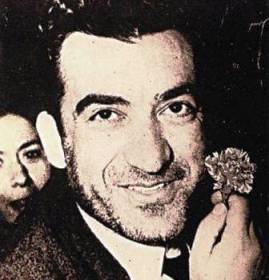Also known as:
Nikos Belogiannis, Νίκος Μπελογιάννης
More People of Greece
More Topic Categories
Related Destinations
Nikos Beloyiannis (22/12/1915 - 30/03/1952)
 Nikos Beloyiannis was a Greek resistance leader against the Germans.
Nikos Beloyiannis was a Greek resistance leader against the Germans.He was born in 1915 in Amaliada. He enrolled at Law School but never finished his studies, because he was expelled from University for his actions against the “cosmogony of Kondylis”. He became member of the Greek Communist Party in 1934. Since then, he was arrested, exiled, and tortured. During the German Occupation of Greece, he was the leader of the Greek Popular Liberation Army (ELAS) in Peloponnese, as well as member of the local Communist Party office. Beside his leadership there, he also wrote a series of articles and essays around Greek history and the financial growth of the country.
About a year after the end of the Civil War, Nikos Beloyiannis and 93 of his Communist comrades – including Dromazos, Grammenos and Ioannidou – were arrested and were put to trial on 22 October 1951. They were accused of trying to revive the Greek Communist Party (KKE), which according to a law that had been passed earlier, was considered illegal, treasonous, guided by powers outside Greece, and a party that acted against the territorial integrity of the country. On 15 November, the president of the court, along with the other military judges, including Georgios Papadoupoulos (the future dictator of Greece), delivered the final verdict. Beloyiannis along with other defendants was sentenced to death. The verdict created huge unrest and protests abroad, while the political atmosphere inside the country was charged dangerously.
Three months later, on 15 February 1952, the trial was repeated. Within a week, the Plastiras government received over 250,000 telegrams from all over the world, asking for Beloyannis’ release. Among those asking for his release were some famous figures of the period, including Charles de Gaul and most French politicians, 159 members of the British Parliament, Paul Eluard, Jean Cocteau, Jean Paul Sartre, Nazim Hikmet, Pablo Picasso, Charlie Chaplin and many others. After a fifteen day trial, during which Beloyiannis held a single red carnation in hand and was greatly calm, the president of the military court decided that Beloyiannis and seven of the other defendants were found guilty and sentenced to death. On 30 March, the royal prosecutor announced to Beloyannis, Kaloumenos, Argyriadis and Mpatsis, that their petition for a royal pardon had been rejected. Later that day, they were sent to the firing squad; the Prime Minister Nikolaos Plastiras collapsed afterwards. That was when the great Greek poet Yannis Ritsos, inside a concentration camp for political prisoners, wrote the poem “The Man With the Carnation”.
See Also:
 Athens Photos
Athens Photos
 Santorini Photos
Santorini Photos
 Crete Photos
Crete Photos
 Meteora Photos
Meteora Photos
 Corfu Photos
Corfu Photos



